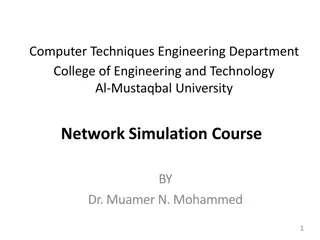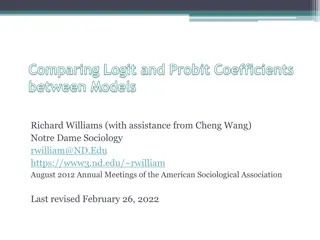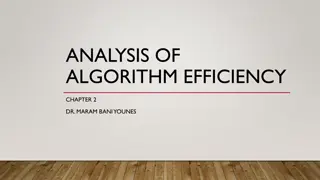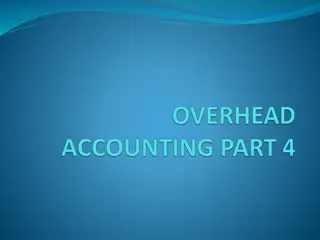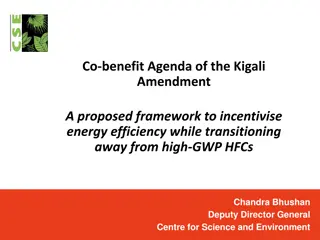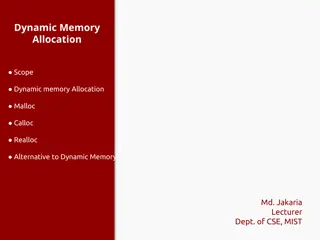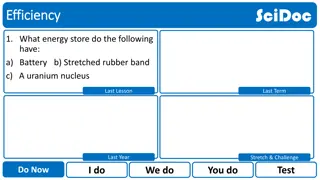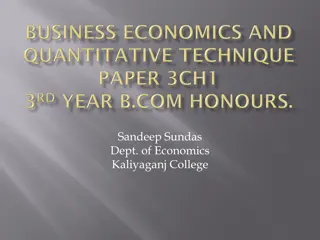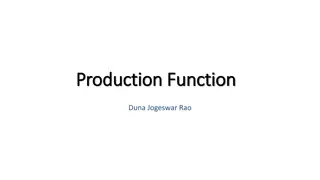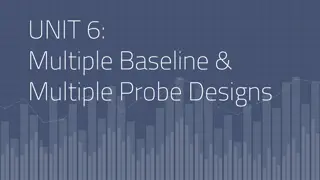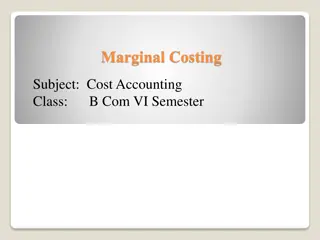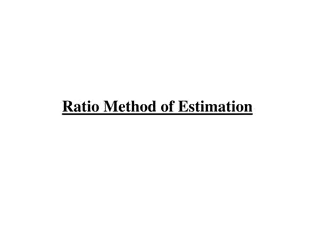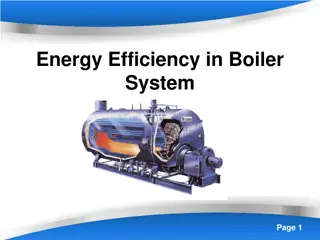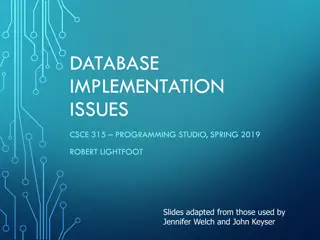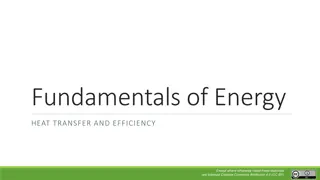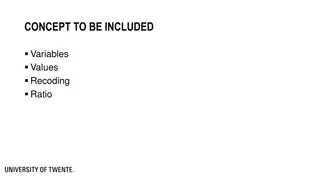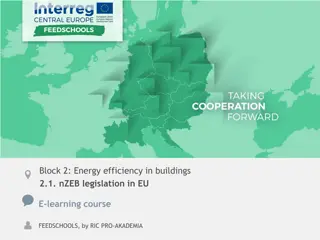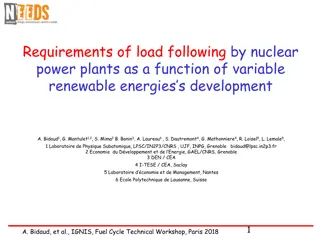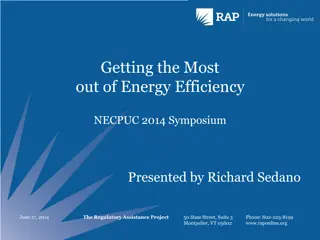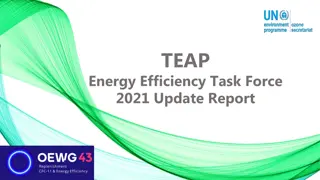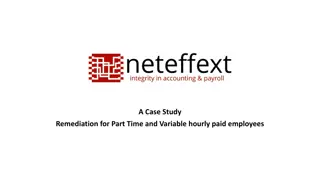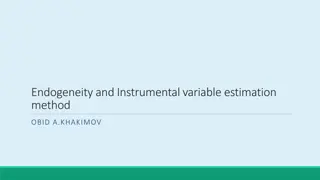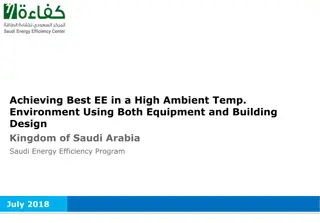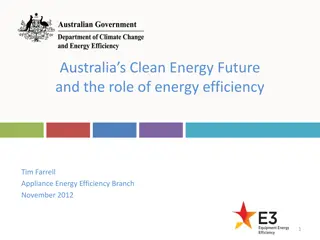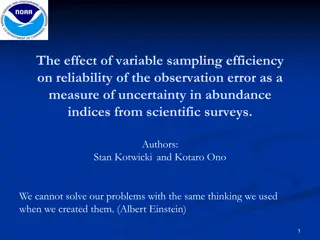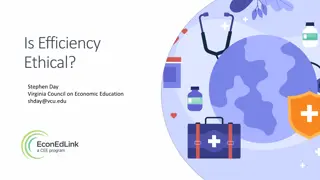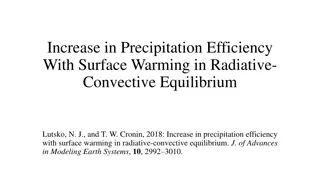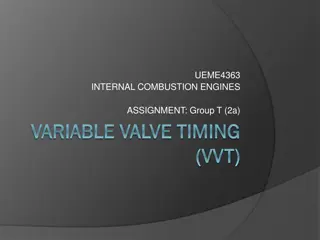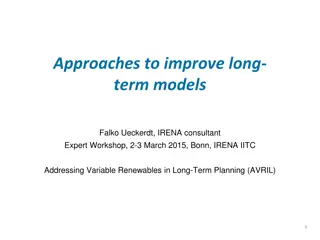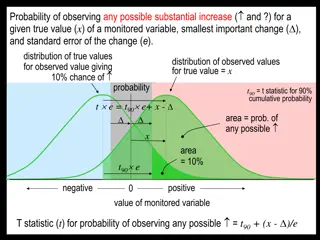Understanding Investigations in Science
Investigating in science involves various approaches beyond fair tests, such as pattern-seeking, exploring, and modeling. Not all scientists rely on fair tests, as observational methods are also commonly used. The scientific method consists of steps like stating the aim, observing, forming hypothese
1 views • 20 slides
Network Simulation Course on Variable Length Subnet Masks (VLSM) at Al-Mustaqbal University
This course, conducted by Dr. Muamer N. Mohammed at Al-Mustaqbal University's College of Engineering and Technology, focuses on Variable Length Subnet Masks (VLSM). The lectures cover VLSM techniques, subnetting with and without VLSM, application of VLSM, examples of VLSM implementation, and practic
2 views • 11 slides
Challenges and Opportunities in Harmonizing School Principals' Salaries
The retribution structure of school principals involves various components such as fixed salary, variable positions, and performance-based pay. The allocation of these components, particularly the variable portion, poses challenges due to discrepancies among regions. Despite recent increases, there
2 views • 16 slides
Understanding the Concept of Return to Factor in Production Economics
Return to Factor is a key concept in production economics that explains the relationship between variable inputs like labor and total production output. The concept is based on the three stages of production - increasing returns, diminishing returns, and negative returns. By analyzing the behavior o
0 views • 7 slides
Comparing Logit and Probit Coefficients between Models
Richard Williams, with assistance from Cheng Wang, discusses the comparison of logit and probit coefficients in regression models. The essence of estimating models with continuous independent variables is explored, emphasizing the impact of adding explanatory variables on explained and residual vari
1 views • 43 slides
Understanding Algorithm Efficiency Analysis
In this chapter, Dr. Maram Bani Younes delves into the analysis of algorithm efficiency, focusing on aspects such as order of growth, best case scenarios, and empirical analysis of time efficiency. The dimensions of generality, simplicity, time efficiency, and space efficiency are explored, with a d
1 views • 28 slides
Computation of Machine Hour Rate: Understanding MHR and Overhead Rates
Computation of Machine Hour Rate (MHR) involves determining the overhead cost of running a machine for one hour. The process includes dividing overheads into fixed and variable categories, calculating fixed overhead hourly rates, computing variable overhead rates, and summing up both for the final M
4 views • 18 slides
Understanding Variable Declarations and Conversions in Java
Properly declaring variables in Java is essential before using them. This chapter covers different types of variable declarations, including class variables, instance variables, local variables, and parameter variables. It also explains the concept of type casting and the importance of explicitly de
1 views • 23 slides
Transitioning Towards Energy Efficiency: Co-Benefit Agenda of the Kigali Amendment
The Kigali Amendment proposes a framework to incentivize energy efficiency while phasing out high-GWP HFCs. Reports highlight the urgency to limit global warming to 1.5°C, emphasizing the need for deep emission reductions across all sectors. Investments in low-carbon technologies and energy efficie
0 views • 17 slides
Understanding Dynamic Memory Allocation and Variable Scope in Programming
This content delves into the concepts of dynamic memory allocation, variable scope, and the lifetime of local variables in programming. It explores the scopes of variables in different contexts and addresses issues like dangling pointers and out-of-scope references. The images provided visually enha
0 views • 40 slides
Thermal Efficiency and Controls in Spray Dryers
Understanding the thermal efficiency and control factors in spray dryers is essential for optimizing drying operations in various industries. Factors such as inlet air temperature, heat exchanger efficiency, and solids content influence the overall efficiency of the drying process. Higher efficiency
0 views • 9 slides
Understanding Energy Efficiency in Devices
Energy efficiency is a crucial concept in understanding how well devices convert energy from one form to another. This summary covers the basics of energy stores, calculation of efficiency, and ways to improve efficiency in devices. Explore the different types of energy stores such as batteries, str
0 views • 15 slides
Laws of Production in Economics
The content discusses the laws of production in economics, including the law of variable proportion in the short run and the law of returns to scale in the long run. It explains the concepts of total product, average product, and marginal product, along with the stages of production. The law of vari
0 views • 18 slides
Understanding the Production Function and Laws of Production
Production function expresses the relationship between inputs and outputs, showcasing how much can be produced with a given amount of inputs. The laws of production explain ways to increase production levels, including returns to factors, law of variable proportions, and returns to scale. The law of
2 views • 20 slides
Understanding Multiple Baseline Designs in Behavioral Experiments
Multiple Baseline Designs are a type of experimental design used in behavioral research. This design involves measuring two or more behaviors concurrently in a baseline condition, applying a treatment variable to one behavior at a time while maintaining baseline conditions for others, and then seque
0 views • 34 slides
Understanding Workpapers in Energy Efficiency Programs
Dive into the world of workpapers in energy efficiency programs, covering topics such as workpaper development, deemed energy efficiency measures, the Database of Energy Efficiency Resources (DEER), and the components that make up a workpaper. Explore why workpapers are essential for providing neces
0 views • 119 slides
Efficiency Analysis of Microfinance Institutions in Papua: A Study by Dr. Muneer Babu
Analysis of the performance and efficiency of Microfinance Institutions in Papua New Guinea, focusing on the provision of financial services to the underbanked population. The study evaluates the resource utilization and efficiency of MFIs, comparing less efficient and highly efficient institutions.
0 views • 18 slides
Understanding Marginal Costing in Cost Accounting
Marginal Costing is a cost analysis technique that helps management control costs and make informed decisions. It involves dividing total costs into fixed and variable components, with fixed costs remaining constant and variable costs changing per unit of output. In Marginal Costing, only variable c
1 views • 7 slides
Ratio Method of Estimation in Statistics
The Ratio Method of Estimation in statistics involves using supplementary information related to the variable under study to improve the efficiency of estimators. This method uses a benchmark variable or auxiliary variable to create ratio estimators, which can provide more precise estimates of popul
0 views • 30 slides
Understanding Energy Efficiency in Boiler Systems
Learn about the importance of energy efficiency in boiler systems, the different types of boilers, boiler components, major losses in boiler efficiency, methods for assessing efficiency, and calculations using the direct method. Exploring topics such as boiler efficiency, water treatment systems, fu
2 views • 55 slides
Database Implementation Issues in Programming Studio
Key topics covered in the slides include database implementation issues, storing data efficiently, and strategies for handling variable length fields in tuple storage. The presentation delves into specialized algorithms for database efficiency and reliability, terminology related to database impleme
0 views • 32 slides
2020 Company Confidential - Add-Ons and Variable Properties Guidelines
This document provides guidelines for add-ons and variable properties within the context of the 2020 Company Confidential data. It covers various aspects such as variable validations, logic return types, export/import considerations, and the handling of accessory items. The content emphasizes the pr
0 views • 39 slides
Understanding Energy Efficiency and Conservation Fundamentals
This unit introduces basic terms related to energy, efficiency, and conservation, covering topics such as Efficiency and Conservation Energy, First and Second Law of Thermodynamics, and various heat transfer mechanisms. It emphasizes responsible energy use, focusing on efficiency, conservation, and
0 views • 14 slides
Understanding Variable Recoding and Transformation in SPSS
Learn how to change variable types, recode values, and transform data in SPSS to enhance analysis accuracy and efficiency. Discover techniques for handling various levels of measurement, creating new variables, and managing value labels effectively.
0 views • 15 slides
Understanding EU Legislation and Energy Efficiency in Buildings
This module explores the EU legislation and energy efficiency in buildings with a focus on Nearly Zero Energy Building (nZEB) concepts. It covers the importance of increasing energy efficiency in buildings in the EU, showcasing statistics on energy consumption and CO2 emissions. By improving energy
1 views • 23 slides
Load Following by Nuclear Power Plants in Relation to Variable Renewable Energies' Development
The study explores the requirements of load following by nuclear power plants in the context of variable renewable energies' growth. It discusses the impact of renewable energy development on nuclear economic models and the need for dispatchable capacities. Benchmarks are set to test robustness of d
0 views • 11 slides
Enhancing Energy Efficiency for Sustainable Development
This content covers a symposium on maximizing energy efficiency, presented by Richard Sedano at the NECPUC 2014 event. It introduces the Regulatory Assistance Project (RAP), a non-profit organization aiding government officials in energy and environmental issues with a focus on cost-effective energy
1 views • 27 slides
Addressing Energy Efficiency in Cooling Sector: 2021 Report Highlights
The 2021 update report from the TEAP Energy Efficiency Task Force emphasizes the critical nature of the climate emergency and the need to transition to lower GWP refrigerants and higher efficiency cooling systems. The report focuses on initiatives to enhance the efficiency of room ACs and refrigerat
0 views • 44 slides
Python Basics: Comments, Variable Names, Assignments, and More
Learn about the basics of Python programming, including the use of comments to explain code, defining variable names, type conversion, assignment operators, and general guidelines for coding practices. Explore how to effectively use comments to describe code functionality and understand the signific
0 views • 21 slides
Remediation Strategies for Part-Time and Variable Hourly Employees in Holiday Act Compliance
This case study delves into the challenges faced in managing leave liabilities for part-time and variable hourly employees under the Holidays Act 2003. It explores various working profiles such as split shifts, cycle shifts, variable shifts, and seasonal work, presenting issues in calculating leave
0 views • 18 slides
Understanding Endogeneity and Instrumental Variable Estimation Methods
Endogeneity in econometrics can create challenges such as omitted variables bias, measurement error, simultaneous causality, and using lagged values. This can affect the accuracy of models. One way to address this is through instrumental variable estimation methods. These methods help deal with endo
1 views • 42 slides
Enhancing Energy Efficiency in Saudi Arabia: SEEC's Impactful Initiatives
The Saudi Energy Efficiency Center (SEEC) plays a crucial role in improving energy efficiency in Saudi Arabia through strategic programs and initiatives. Established in 2010, SEEC focuses on sectors like transportation, industry, and buildings, with a goal to reduce energy consumption and promote aw
0 views • 29 slides
Australia's Clean Energy Future: Role of Energy Efficiency Programs
The discussion revolves around Australia's clean energy future and the pivotal role of energy efficiency in driving sustainable practices. It covers topics such as the Carbon Pricing Mechanism, Encouraging Energy Efficiency initiatives, and the Equipment Energy Efficiency Program (E3). The success s
0 views • 13 slides
Understanding Variable Sampling Efficiency in Scientific Surveys
Exploring the impact of variable sampling efficiency (qe) on the reliability of observation error in abundance indices from scientific surveys. Authors delve into the complexities of survey design, factors affecting qe, and the need to adapt to variable efficiency. Studies show both random and non-r
0 views • 29 slides
Overview of Korea's Energy Efficiency Programs and Compliance Issues
Korea's energy efficiency programs include mandatory labeling and standards for various products such as refrigerators, air-conditioners, and TVs. The country faces compliance challenges related to adopting the standards of Energy Frontier, which focus on ultra-high efficiency products. Strategies t
0 views • 19 slides
Exploring the Ethics of Efficiency in Economics Education
Delve into the intriguing discussion on whether efficiency is ethical in the realms of economics and education. This session, featuring the new Ethics, Economics, and Social Issues curriculum through EconEdLink, analyzes the concept of efficiency through diverse examples and engages participants in
0 views • 26 slides
Increase in Precipitation Efficiency with Surface Warming
The study examines how surface warming affects precipitation efficiency in radiative-convective equilibrium. Various factors influencing precipitation efficiency, such as microphysical processes and climate sensitivity, are discussed. Model experiments are conducted to test the sensitivity of precip
0 views • 33 slides
Understanding Variable Valve Timing (VVT) in Internal Combustion Engines
Variable Valve Timing (VVT) optimizes engine performance by adjusting valve duration, timing, and lift according to engine speed, enhancing torque, power, and fuel efficiency. VVT operates by varying intake valve opening/closing, regulating valve timing, and adjusting lift for better volumetric effi
0 views • 14 slides
Enhancing Long-Term Energy Models for Variable Renewables
Explore approaches to enhance long-term energy models for integrating variable renewables in long-term planning. Key aspects include improving generation networks, ensuring sufficient capacity and reliability, flexibility, robustness to contingencies, and security considerations. Temporal matching o
0 views • 22 slides
Probability Scenarios for Monitoring Variable Changes
Explore various probability scenarios when observing substantial increases, decreases, or unclear changes in a monitored variable based on the true value, smallest important change, and standard error of the change. Understand the likelihood of different outcomes and how to calculate probabilities f
0 views • 5 slides

